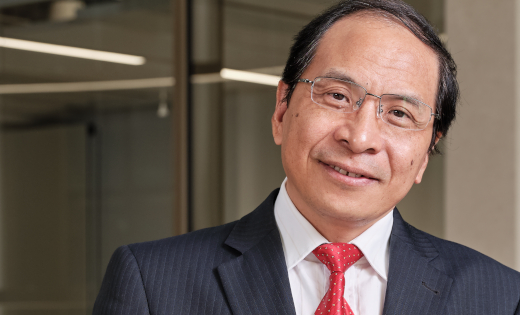Vice-Chancellor's Blog: Research and Innovation
Professor Hai-Sui Yu, Interim Vice-Chancellor and President, reviews the first of his six core priorities, research and innovation.

Dear colleagues, I would like to take this opportunity to focus on research and innovation – the first of my six core priorities. Last week, our first Senate meeting of the year enjoyed a comprehensive update from Deputy-Vice Chancellor: Research and Innovation, Nick Plant, about our research performance over recent years. Although our strong performance in the 2021 Research Excellence Framework (REF) is well known, it is worth restating as a testament to the quality found across our research community. And in the latest Knowledge Exchange Framework (KEF), published in September, our research community again performed well. As with any assessment of the research and innovation activity carried out across the University, both of these national excellence frameworks must be considered within the context of our overarching strategy and values and key performance indicators. It is interesting to note how our research grant portfolio is recovering following the disruption of the pandemic. Following the fall in new research awards in 2019/20 resulting from COVID-19, they rose in 2022/23 for the third successive year, finishing at £190 million in value. The total value of applications submitted for 2022/23 (£785m) is 27% ahead of last year’s result, with the largest increase in applications to research councils. In the KEF, we are in the top quintile for our intellectual property (IP) and commercialisation, attract the highest levels of external investment for our spin-outs, and secure very high levels of income from our IP as a proportion of our research income. While the proportion of our students creating graduate start-ups is high, our income from Continuing Professional Development (CPD) is relatively low. Increasing this and other professional learning activity will be a key priority in the new Business Engagement and Enterprise Strategy under development by the PVC for Business Engagement and Enterprise, Martin Stow. Meanwhile, our Postgraduate Research Experience Survey (PRES) results indicate that our PGR community – the next generation of research leaders – are generally positive about their experience at Leeds. We are right to celebrate these results, along with the positive signs indicating a return to pre-pandemic levels of research activity, but must also acknowledge there is work to do to further improve the quality and impact of our research and innovation portfolio. It is vital that we continue to support our research community, providing the time, confidence, and resources to successfully undertake and deliver our transformational research. Across the University, our staff are our most important asset. We must strive to retain and nurture existing colleagues, as well as recruiting the best candidates for any role – academic or non-academic – and then support them to deliver their best. We must support staff in developing their skills, and reward and recognise their achievements. We are currently developing a talent strategy that will maintain the portfolio of staff that we need to succeed and to provide colleagues with clear career pathways as a culture and environment that will help them flourish. Key practical steps for this will be considered in due course by the University Executive Group (UEG). I am pleased that progress has been made over the past year in reducing the number of fixed-term contracts used to employ staff at the University. The percentage of colleagues on these arrangements has been halved in a year, underlining our continued commitment to improve job security. And today we have announced further support for our staff in the form of pay increases for colleagues in Grades 2 to 4, as well as continuing our commitment to the Real Living Wage for our lowest paid staff. I am pleased that we have been able to reach an accord with our recognised trade unions on this issue and hope that we can continue these constructive discussions as we progress the wider Pay and Grading Review for staff at other grades. As part of my commitment to supporting our research activity, it was an honour to introduce a prestigious speaker Professor Bart de Strooper, a globally-renowned Alzheimer’s disease researcher, at a high profile event organised by our Astbury Centre for Structural Molecular Biology on Monday. The University also hosted a fascinating and important debate on the theme of developing a sustainable health and social care workforce. It was a pleasure to open last Thursday’s event, one of a series organised by the N8 Research Partnership and RSA, and to welcome significant sector figures to take part in the discussion. These included former NHS England chief executive Lord Nigel Crisp, NHS Workforce Plan Director Barny Leavers and Fatima Khan-Shah from West Yorkshire Health and Care Partnership. The debate centred on how cross-sector collaboration can address the challenges facing the health and social care workforce, and you can read more about the debate here. I look forward to continuing our conversations next week as we start of a series of staff forums for each faculty and professional service, with colleagues at Leeds University Business School (LUBS) hosting the inaugural session on Monday. At these, you can ask questions directly of myself and my UEG colleagues about any aspect of working at the University. Do look out for your invitation to these events over the next few weeks. Best wishes, Hai-SuiPosted in: University newsResearch and innovationStudent educationMy Week